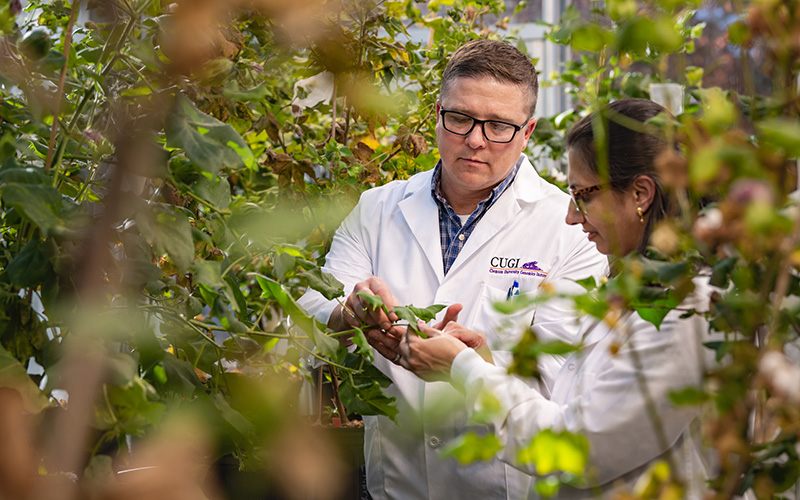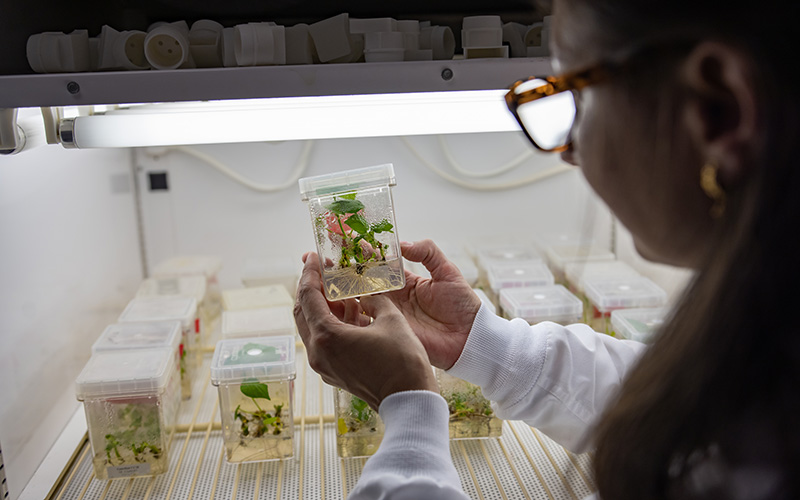-
Undergraduate Majors
- Undergraduate Majors Overview
- Agribusiness
- Agricultural Education
- Agricultural Mechanization & Business
- Animal & Veterinary Sciences
- Environmental & Natural Resources
- Food Science & Human Nutrition
- Forest Resources Management
- Horticulture
- Packaging Science
- Plant and Environmental Sciences
- Turfgrass
- Wildlife & Fisheries Biology
-
Graduate Programs
- Graduate Programs Overview
- Request for Information
- Agricultural and Applied Economics (MS)
- Agricultural Education (MAgEd)
- Agriculture (MS, PhD)
- Animal & Veterinary Sciences (MS, PhD)
- Entomology (MS, PhD)
- Food, Nutrition and Culinary Sciences (MS)
- Food, Nutrition, and Packaging Sciences (PhD)
- Forest Resources (MFR, MS, PHD)
- Packaging Science (MS)
- Plant and Environmental Sciences (MS, PhD)
- Wildlife and Fisheries Biology (MWFR, MS, PhD)
- Certificate Programs
- Scholarships
- Academic Departments
- Academic Advising
Translational Genomics Certificate Program
Overview
The College of Agriculture, Forestry and Life Sciences (CAFLS), offers a Translational Genomics Certificate that equips graduate students to turn genomic discoveries into real-world solutions, meeting urgent educational and industry needs.
-
What is Translational Genomics
Translational genomics is vital in bridging foundational scientific research with practical applications, enabling breakthroughs that enhance agricultural productivity, sustainability, and human health outcomes. By accelerating the conversion of genomic insights into innovative technologies, such as improved crop varieties and precision medicine, this field plays a pivotal role in tackling global challenges like food insecurity, climate resilience, and disease prevention.
-
What To Expect From This Program
Through this program, graduate students gain exposure to cutting-edge coursework, hands-on research experiences, and professional networks. This fosters expertise in genomics and computational sciences, empowering participants to solve pressing problems in agriculture—such as developing resilient crops and optimizing resource use—and human health, including advancing personalized therapies and understanding genetic contributions to diseases.
While primarily designed for CAFLS students, the program is open to those from other colleges, promoting interdisciplinary collaboration.
-
Contact
Christopher Saski, Ph.D.
Professor
Systems Genetics
Department of Plant and Environmental SciencesPhone: (864) 656-6929
Email: saski@clemson.edu
Address:
306B Biosystems Research Complex
105 Collings Street
Clemson University
Clemson, South Carolina 29634

Curriculum Requirements
(must include specific course work)
Graduate students must complete a total of 14 credit hours of approved courses.
-
Required Course
- PES 8060 - Special Problems in Plant Sciences (My Favorite Gene)
- 1 credit hour
- PES 8060 - Special Problems in Plant Sciences (My Favorite Gene)
-
Core Courses - Select 2
- BIOL 6030 - Introduction to Applied Genomics
- 3 credit hours
- GEN 6400 - Bioinformatics
- 3 credit hours
- MICR 8130 - Practical Bioinformatics for Microbiologists
- 3 credit hours
- GEN 4020/6020 - Molecular Genetics and Gene Regulation
- 3 credit hours
- GEN 4450 - Medical Bioinformatics
- 3 credit hours
- GEN 6100 - Population and Quantitative Genetics
- 3 credit hours
- BIOL 6030 - Introduction to Applied Genomics
-
Journal Club - Select 2
- BIOL 8710 - Special Topics (Macroevolutionary Methods)
- 1 credit hour
- GEN 8900 - Digital Biology
- 1 credit hour
- PES 8900 - Crop Biotech Journal Club
- 1 credit hour
- PES 8900 - Pulse Breeding Journal Club
- 1 credit hour
- STAT 8110 - Special Problems in Experimental Statistics
- 1 credit hour
- BIOL 8710 - Special Topics (Macroevolutionary Methods)
-
Two Additional Courses (6 hours)
- AVS 6700 - Animal Genetics
- 3 credit hours
- BIOL 6050 - Molecular Genetics of Eukaryotes
- 3 credit hours
- CPSC 6550 - Computational Science
- 3 credit hours
- CPSC 8650 - Data Mining
- 3 credit hours
- CPSC 6620 - Database Management Systems
- 3 credit hours
- GEN 6500 - Comparative Genetics
- 3 credit hours
- GEN 8100 - Principals of Molecular Biology
- 4 credit hours
- GEN 8140 - Advanced Genetics
- 4 credit hours
- HCG 9050 - Genomics, Ethics, and Health Policy
- 3 credit hours
- MATH 8040 - Statistical Inference
- 3 credit hours
- MATH 8050 - Design and Analysis of Experiments
- 3 credit hours
- MICR 6150 - Microbial Genetics
- 3 credit hours
- PES 6050 - Plant Breeding
- 3 credit hours
- PES 6450 - Regulatory Issues and Policies
- 3 credit hours
- PLPA 6700 - Molecular Plant Pathology Interactions
- 3 credit hours
- PES 8500 - Agricultural Biotechnology
- 2 credit hours
- STAT 8190 - Biostatistics
- 3 credit hours
- PES 8300 - Plant Cell and Tissue Culture
- 3 credit hours
- PES 8090 - Analytical Technique
- 3 credit hours
- STAT 8020 - Statistical Methods II
- 3 credit hours
- ENT 6200 - Systematics and Biodiversity
- 4 credit hours
- AVS 6700 - Animal Genetics
Benefits of a Certificate
Earning a certificate in translational genomics significantly strengthens a student's profile for scholarships, fellowships, and career opportunities, especially those supported by private sector organizations and foundations dedicated to translational research.
By completing this certificate, students acquire invaluable knowledge and position themselves as leaders in translational genomics, driving progress that sustains agriculture, protects ecosystems, and safeguards human health for future generations.
-
Benefits to Student Profile
Interdisciplinary Expertise. The program integrates bioinformatics, data analysis, and regulatory knowledge, providing a versatile, species-agnostic skill set in genetics, genomics, and computational biology. This broad foundation enables students to address multifaceted challenges, from enhancing crop nutrition to improving environmental health and reducing disease burdens in human populations.
Enhanced Career Opportunities. Graduates are well-prepared for roles in biotechnology and biomedical sciences, where translational genomics drives the development of novel therapies, precision agriculture tools, and sustainable farming practices.
Research Experience. Hands-on research components allow students to apply genomic techniques to real challenges, such as engineering crops for higher yields or identifying genetic markers for human diseases.
Preparation for Advanced Studies. The certificate builds skills in generating, analyzing, and managing genomic data, while developing an understanding of its applications across life sciences. It serves as excellent preparation for medical, professional, or graduate programs.
Networking Opportunities. Program activities, including seminars, workshops, and collaborations with industry professionals and distinguished researchers create mentorship and partnership avenues to expand professional networks.
Alignment with Funding Priorities. This program will provide critical insight into how funding bodies, such as the NSF, NIH, USDA, and other research foundations, prioritize translational genomics for its potential to yield high-impact results. Certificate holders stand out as candidates ready to contribute to programs that enhance crop sustainability, mitigate environmental risks, and improve health equity.
-
Skills Gained After Completion
Students successfully completing this certificate will be proficient in the following:
Relevant experimental design - Comprehensive application of genomics analytical techniques relevant to experimental designs, enabling the translation of research into agricultural improvements and health interventions.
Data and datasets as accessible resources - Basic principles of dataset management and access for computational genomics data, supporting efficient use in diverse applications from crop breeding to clinical genomics.
Beyond data as bits of information - Connection between fundamental biology principles and applied research objectives linking genomics data to phenotypic variation and contribution of environmental factors, which is essential for developing resilient agricultural systems and personalized human health strategies.
Sophisticated problem - solving skills to address real challenges. Synthesize concepts bridging academic knowledge across the disciplines of genomics, genetics, statistics, and computational biology to address grand challenges impacting South Carolina, the Southeastern US, the nation, and the world.

